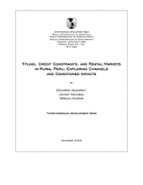Titling, Credit Constraints and Rental Markets in Rural Peru: Exploring Channels and Conditioned Impacts
Date
Nov 2008
This paper constructs a baseline and pursues an overall impact evaluation of the PETT (Programa Especial de Titulación de Tierras), an ambitious rural titling program created in Peru in 1992. The general evaluation of impacts on farmers shows a picture of not many positive effects, at least in the short period of the evaluation (2004-2006). On average, most income variables (and income composition) do not seem to be impacted by titling, and there are no detectable effects on investments or other outcome variables, such as credit, land markets, or land conflicts. However, this general picture hides important impacts that may occur for some groups of farmers, or for farmers facing different constraints in the pre-intervention stage. Given the limitations, we investigated in more detail two important channels that are behind the potential impacts of rural titling programs: credit access and use of land rental markets.



